After WeWork (and the Pandemic), Here Comes Coworking's Next Wave
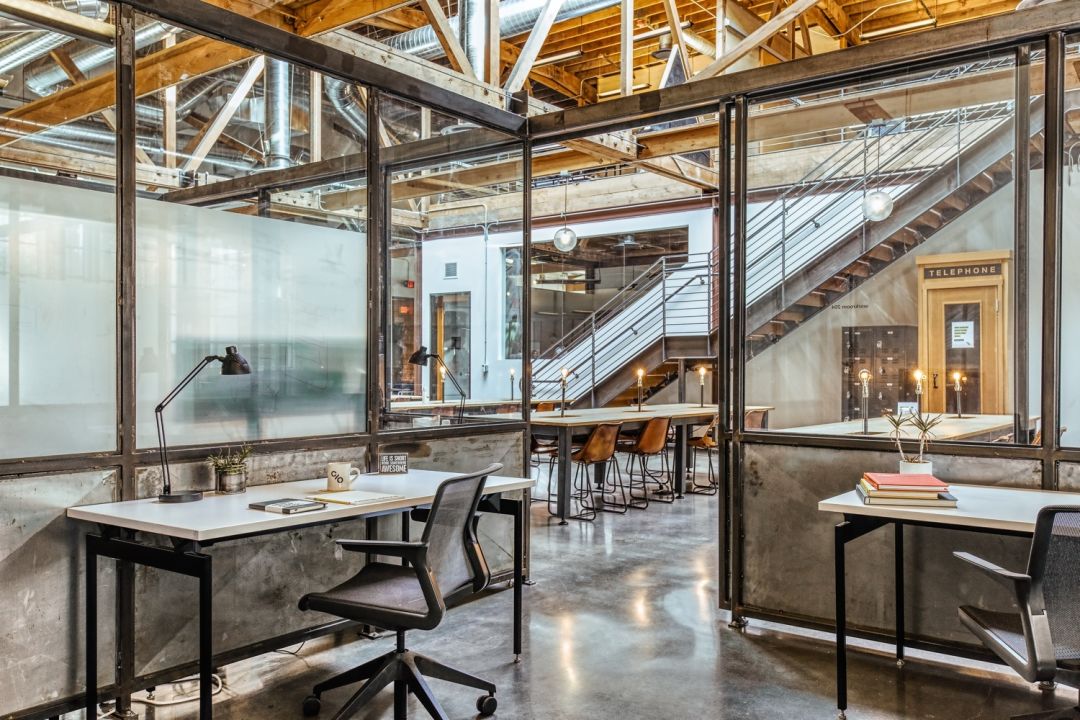
Coworking space at CENTRL Office.
Image: Ryan Watts
Coworkers: you know their kids’ names, the fact that they have therapy every Wednesday at 2 PM, the unfortunate meal that gave them food poisoning last night—but somehow you can’t quite recall their last name.
And if you started a new job within the past two years, you may not have even met your coworkers in person, being forced to gauge their character on the level of irony in their company profile picture or the perceived tone of their Slack messages.
Don’t get us wrong, we live for the interruption of a cat darting across someone’s Zoom screen and the drama of a passive smiley face emoji, but many of us are ready for more in-person water cooler chats, especially as local companies set post-omicron return-to-work dates. A potential solution? Coworking offices: flexible workspaces that typically offer private rooms, conference rooms, and other workplace amenities.
Pre-pandemic, independent entrepreneurs were the ones most likely to book a desk at a coworking community. But these days, with hybrid work schedules giving monthly leases the side-eye, workers (both individuals and businesses) are more apt to consider a coworking alternative. And in turn, coworking spaces are adapting to meet needs you never knew were needs—where the market was once dominated by chains like WeWork, these days, independent alternatives are popping up all over. We at Portland Monthly took the liberty of scouting out some of the best coworking options in the city, depending on what type of coworker you are.
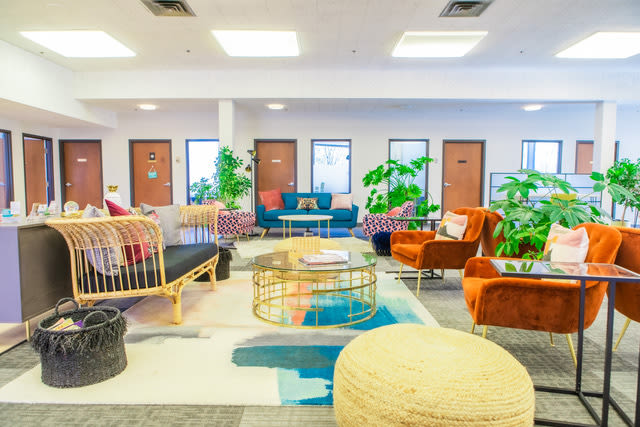
Common space at Vida Coworking.
Image: Kitta Bodmer
If you have to mute yourself due to an ill-timed scream from your child throwing a tantrum off camera, try Vida Coworking.
Aside from an interior aesthetic that would give Anthropologie a run for its money—boho-inspired furniture, natural light, and tons of plants—Vida Coworking provides amenities unlike any other business of its kind in Portland. CEO Melanie Marconi founded Vida in July of 2019, nine months before the pandemic hit. Back then, Marconi, a single mom and remote business owner, was looking for a place to “get all of her daily to-dos done” that could also serve as somewhere to bring her daughter in case of emergency. She felt like parents’ needs weren’t prioritized in many of the coworking spaces that existed at the time, so she decided to open her own.
“I just made all the amenities that I would have wanted,” Marconi says.
Vida memberships range from $250–2,000 per month, depending on what type of work pace you need. Members also have access to amenities like monthly life coaching sessions, an onsite fitness studio (complete with a Peloton bike and treadmill), a self-service café, business assistance services, and more. What really sets Vida apart from other coworking spaces, though, is its emphasis on childcare.
In addition to the “unwind studio”—a quiet space which some members use for pumping or nursing—pre-pandemic, Vida offered onsite childcare services to members. And after the pandemic caused Vida to close completely for 3 months, Marconi and her team opened Vida School: a program where elementary-schoolers could do their online learning in-person.
“We hired a full-time teacher who helped the kids navigate the nightmare of online learning, and we got accredited. So, parents, including me, we would bring our kids, they would have school and play time and then we could get a full day of work in. It was lifesaving,” she says.
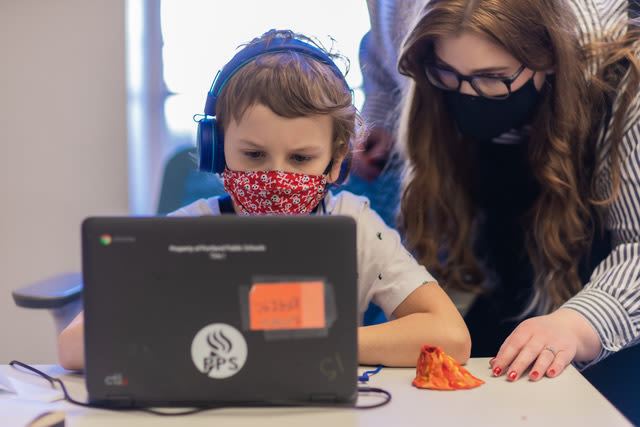
A student at Vida School, accompanied by their "learning coach."
Image: Kitta Bodmer
Vida School, along with its personal assistant service for members, allowed the company to stay afloat throughout the pandemic, while a good number of other coworking spaces in Portland were forced to close. Now, Marconi says, business is almost back to where it was pre-pandemic, and she plans to open a second Portland location with a full childcare center in the near future.
“The pandemic has shown a lot of the weaknesses that exist, both for employees but also for families. Coworking really offers a neat opportunity to kind of bridge that divide and offer amenities, support, and services that a traditional office can’t,” she says.
If you're the coworker who’s constantly blowing up the Slack channel with team bonding invites, and who somehow knows everyone’s astrological sign, try Collective Agency.
One of the trailblazers in the Portland coworking scene, the Collective Agency, owned and operated by Alex Linsker, prioritizes “cozy community” above everything.
“People have described it as like having coworkers, but with all the benefits and none of the side effects,” says Linsker.
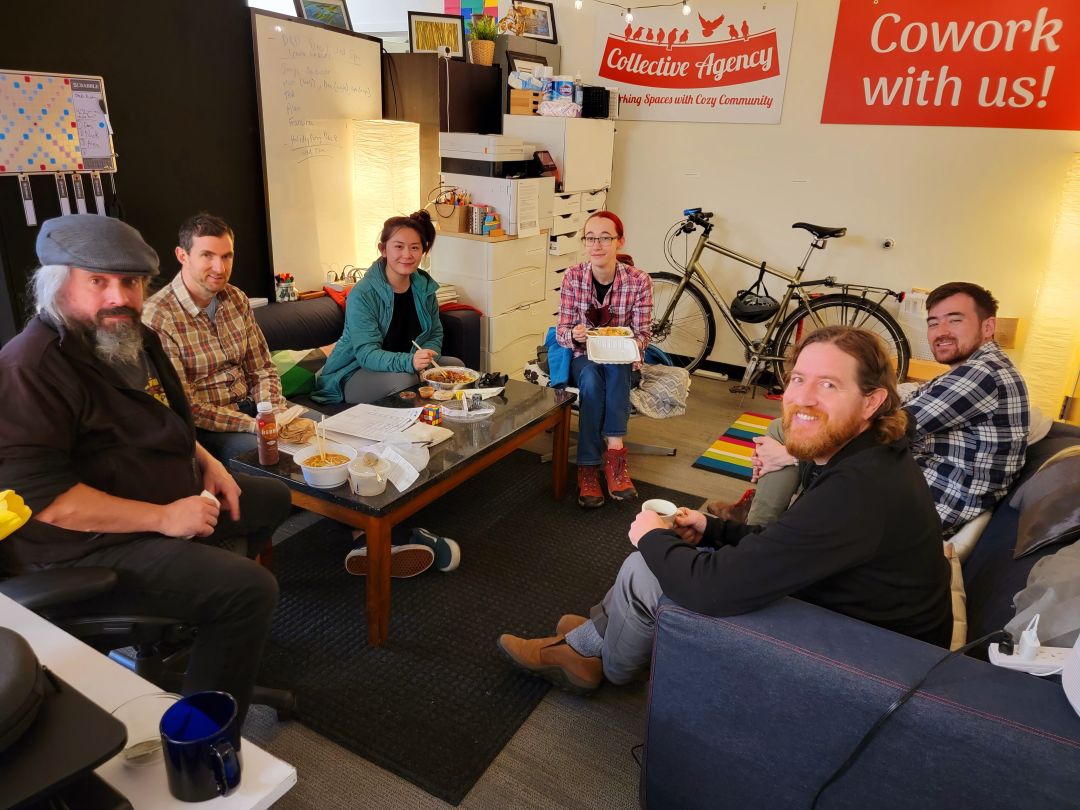
Long-time members of the Collective Agency share lunch together between work.
Image: Alex Linkser
For $250 a month, the most popular option among members, you get access to group events like mini-golfing, Zoom game nights, walks to nearby food trucks, and book club meetings. Oh, and when you actually need to get work done, members are guaranteed their own desk (standing or regular), computer monitor, conference spaces, and more.
Linsker has been in the coworking scene since 1999 and opened Collective Agency in 2011, and he guesses he’s probably been doing this longer than any coworking space owner currently in Portland. He’s witnessed rises and falls within the coworking industry, and estimates that only about half of around 33 coworking spaces in Portland survived the pandemic.
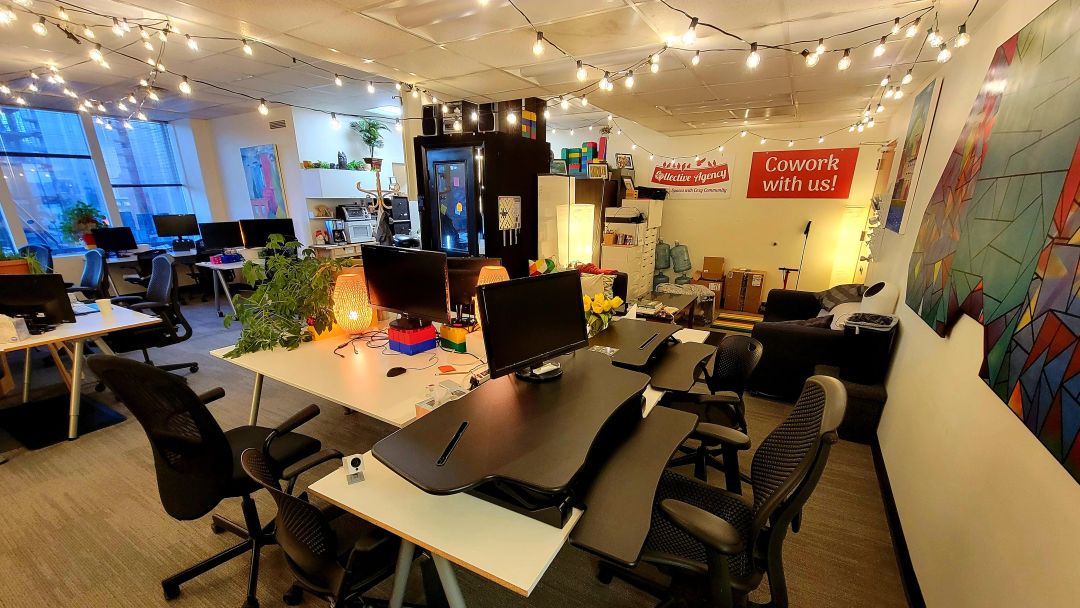
Collective Agency's main office after-hours
Image: Alex Linkser
Even his own office shop was forced to close two of its three locations. With two and a half years left on their lease at their Portland location, Linsker remains cautiously optimistic about the future of coworking.
“As things open up, and with the mask requirement going away, that might help. Once COVID stops being one of the one of the hot topics to talk about, I think coworking will do better,” says Linsker.
If you’re the coworker whose cubicle is proudly decorated with a pride flag and you have to leave early tomorrow to host a climate justice rally, try openHAUS.
“I call our offices the kaleidoscope of hope. No matter what you look like, no matter what you do, no matter how ‘othered’ you are, you are safe here,” says Cole Reed, co-owner of openHAUS coworking.
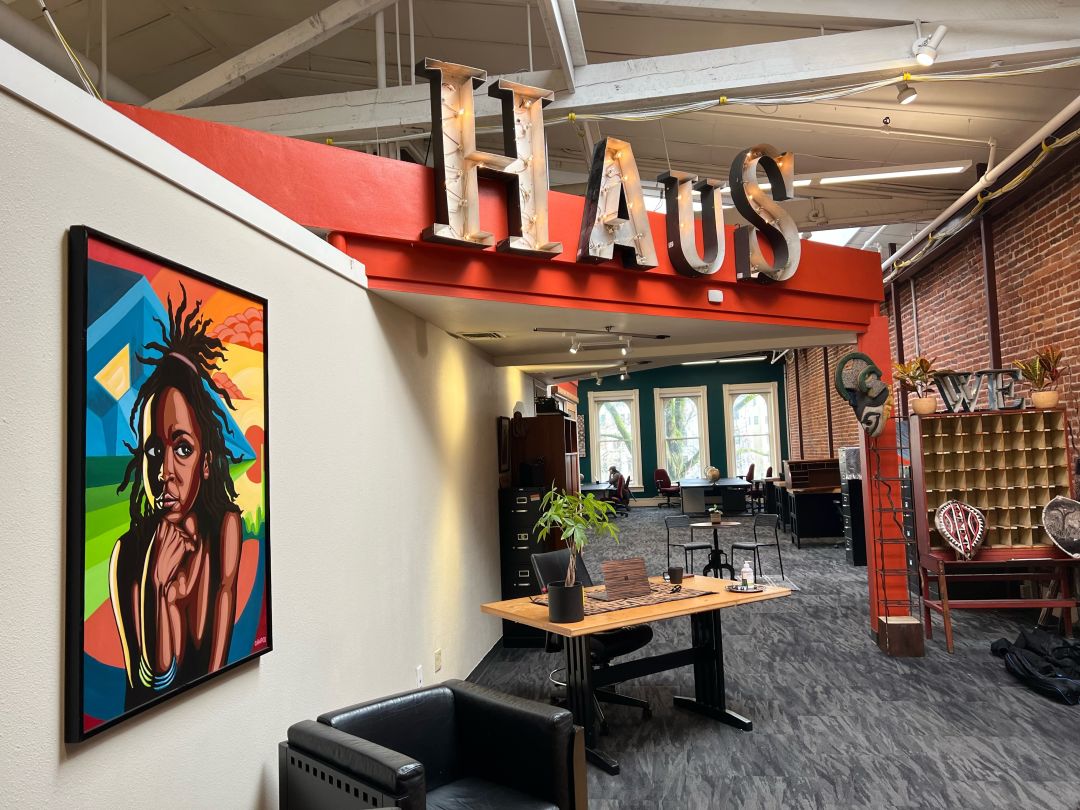
OpenHAUS's NE location.
Image: Jason Hill
OpenHAUS is a Black-owned, LGBTQ-owned, women-owned coworking business, with offices in Northeast Portland and a new location in Northwest Portland. As the name suggests, openHAUS prioritizes inclusivity, with a focus on fostering positive experiences for BIPOC, queer, and femme-identifying people.
Cole and Day Reed, both business and life partners, created openHAUS in 2015 when they noticed that a majority of the existing coworking spaces were “incredibly cis-white male dominated,” Day says. So they decided to go in the other direction (while still welcoming cis-white men, adds Day).
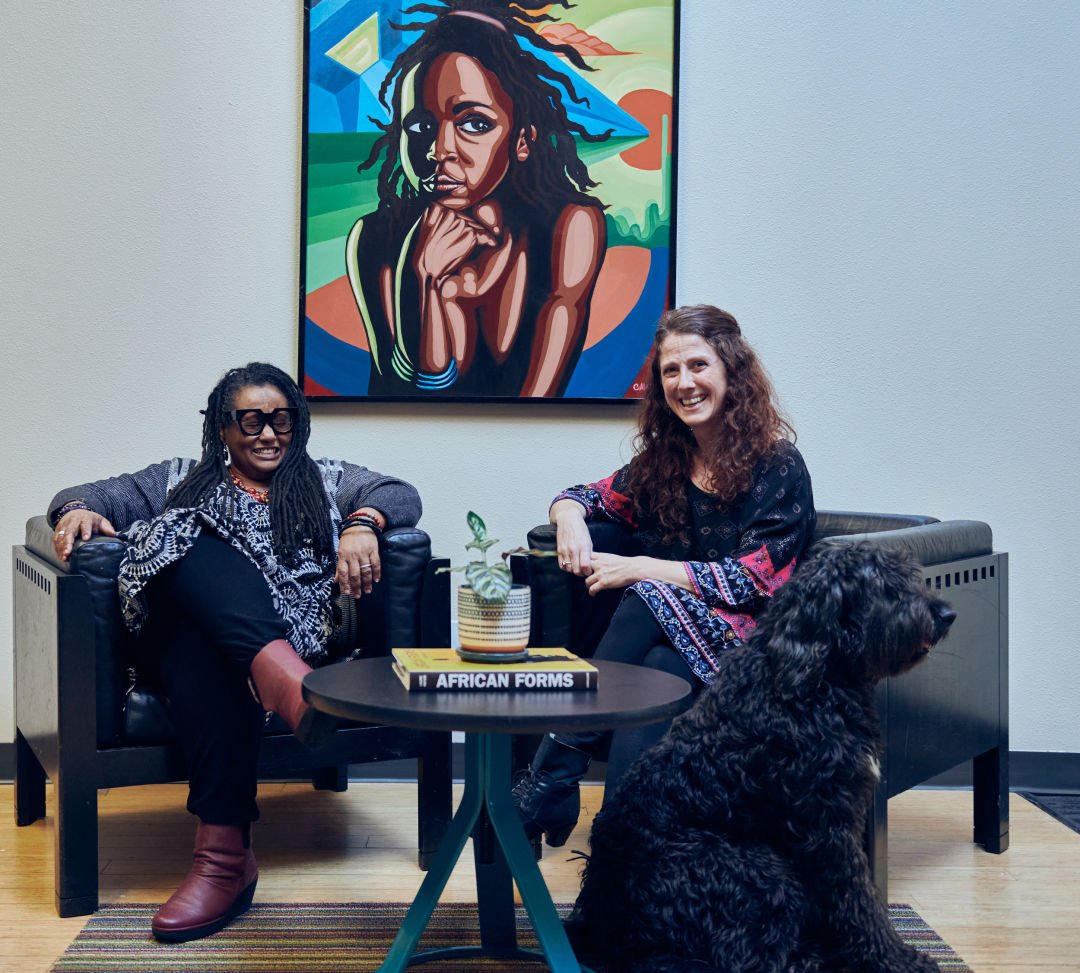
Cole (left) and Day Reed, cofounders of openHAUS
Image: Jason Hill
Prices range anywhere from a $25 drop-in pass to a private office at $1,000/month—with a myriad of options in between—and OpenHAUS offers 15 percent off membership fees to BIPOC people. They are also re-launching “Black Fridays,” which invite people of color to work in the space for free on Fridays.
The business managed to stay open during the pandemic thanks to a rent assistance grant, a federal government grant, and other assistance from the community. Day and Cole created a program called “Dream Street,” which provided local vendors with a space to sell their wares during the pandemic.
“We didn't charge anybody for it. We just wanted people to show up and be in community,” says Cole. “The coworking is important, but the community of coworking is more important.”
If you’re the co-worker who doesn’t know if it’s a WFH or in-person day until they wake up that morning, try CENTRL.
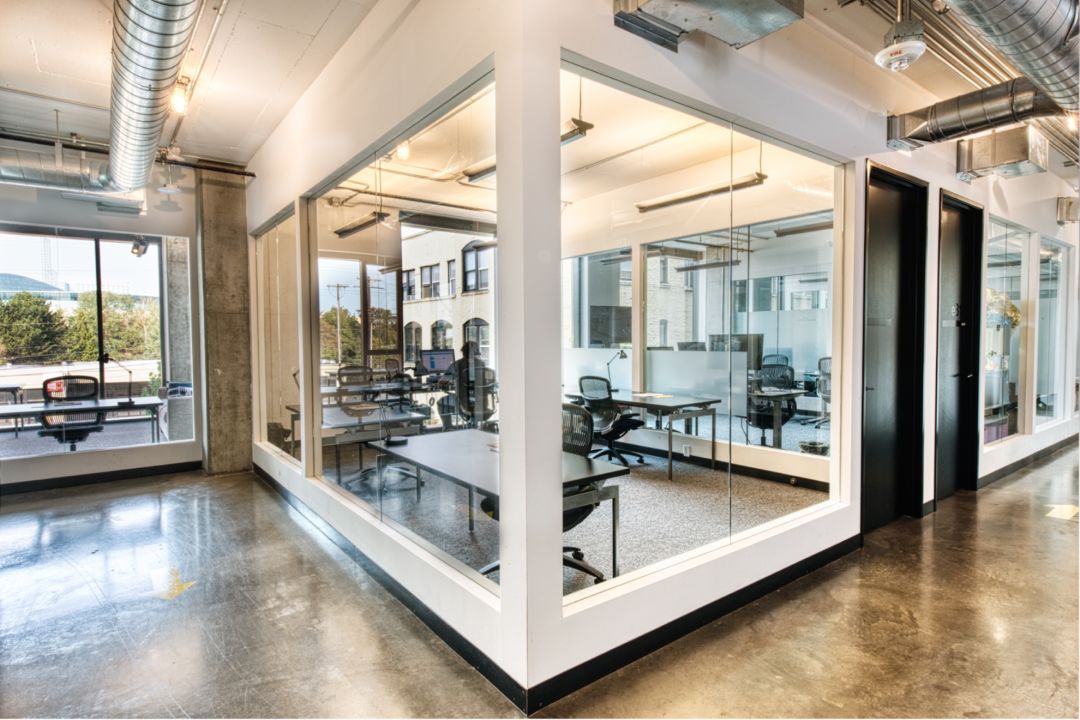
Private coworking office at CENTRL.
Image: Ryan Watts
Since starting up in 2015, CENTRL has become the largest independent coworking operator in the area, with three locations across Portland, one in Lake Oswego, and one in Hood River.
“People are used to having their home office set up, where they have a lot of privacy, at least from their coworkers—maybe not their family,” says Alex Hughes, the company's cofounder. “And so now they’re expecting a lot of those same tools out of their office space.”
CENTRL’s offers private work rooms and flexible memberships; clients are able to book rooms by the hour, as opposed paying up front for an entire month. CENTRL’s demographic, says Hughes, is “everyone in the workforce,” largely individuals and companies who have begun to split up their departments more, due to the “new realities of how people are working.” Hughes says that even before the pandemic, private rooms were becoming a more popular option due to multiple Zoom calls and phone calls happening at once.
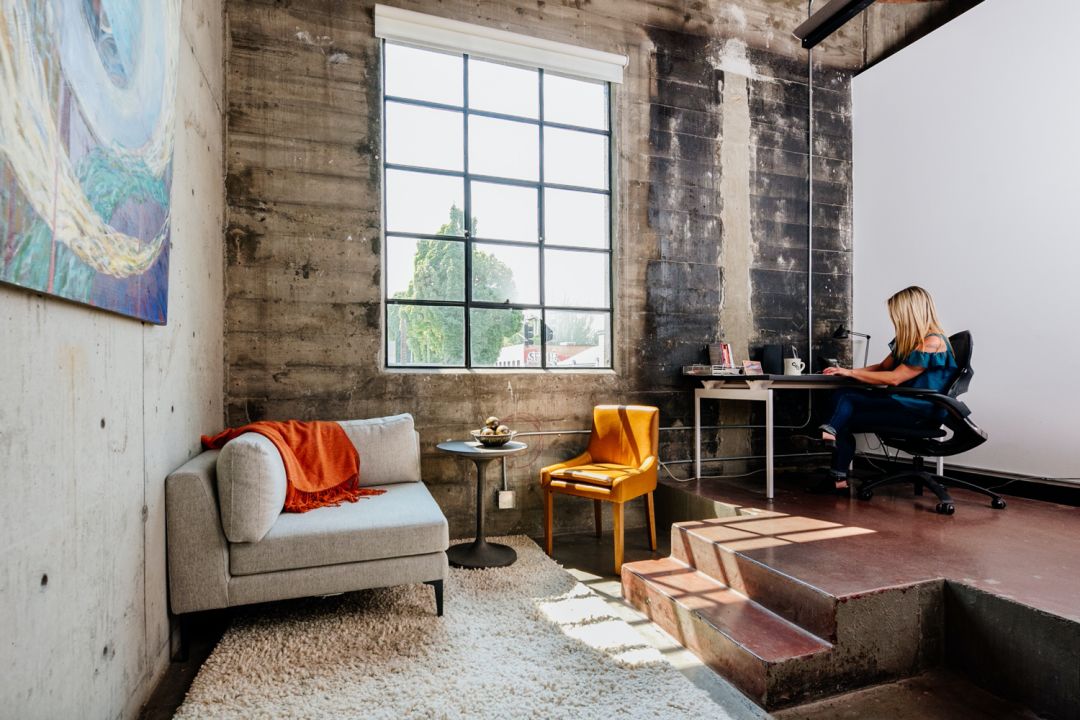
Image: Ryan Watts
“Almost 100 percent of our recent sales have been to groups who are brand new to coworking. They’re all coming out of traditional office space,” says Hughes.




